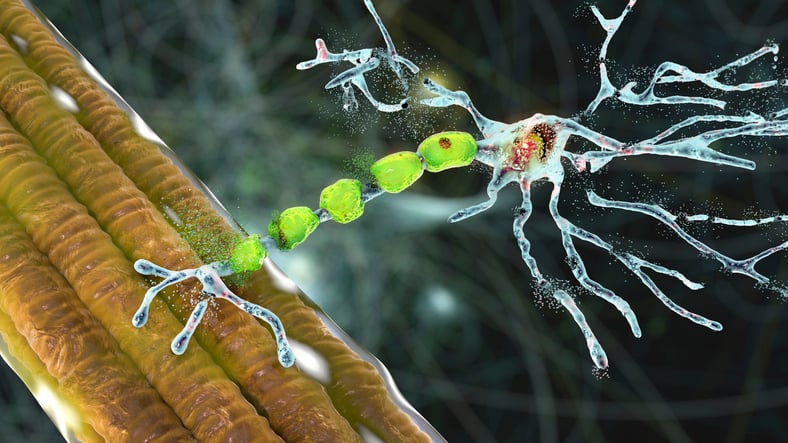预约演示
Athira Pharma's ALS drug boosts survival and slows motor decline in mice, as human studies planned
2024-02-12
临床2期临床3期临床结果

Preview
来源: FierceBiotech
Athira Pharma's drug, ATH-1105, is an oral small molecule that raises levels of neurotropic hepatocyte growth factor, which in turn reduces levels of a disease-causing protein downstream.
Athira Pharma’s amyotrophic lateral sclerosis (ALS) drug ATH-1105 appears to boost survival and reduce motor function decline in mouse models of the disease, according to new data published Feb. 7 in Frontiers in Neuroscience.
“These data demonstrate that ATH-1105 treatment results in significant, consistent beneficial effects both in cell culture and in vivo models of ALS,” Kevin Church, Ph.D., chief scientific officer at Athira, said in a press release. “These studies further support the therapeutic potential and continued development of ATH-1105, which is targeted to advance into first-in-human studies this year.”
The new study reports on experiments conducted on cultured neurons and mouse models. One set of experiments involved 60 male mice, 40 of which were models of ALS—meaning they had a gene mutation that causes the buildup of TDP-43, the most plausible culprit in neuronal damage caused by the disease. The ALS mice were given either ATH-1105 or a control solution beginning from ages 1 to 5 months old.
The time to death was 85 days in the mice that received the control solution and 129 days in the mice treated with ATH-1105. At 152 days, 75% of the treated mice were still alive, compared with 35% of the untreated mice.
Motor function tests showed that ALS mouse models that received the treatment experienced slower motor function decline and better nerve function than the ones that were untreated. The treated animals also lost less weight and had fewer biomarkers associated with neurodegeneration and inflammation.
In addition, the researchers conducted experiments to assess the efficacy of delayed treatment. In this case, the researchers used 40 male mice separated into four groups of 10, including three groups of mice with the same gene mutation that causes TDP-43 buildup and one group of healthy controls. The groups of ALS mouse models were treated with a saline solution, daily doses of ATH-1105 for four months beginning at 1 month old, or daily doses for four months beginning at 2 months old.
While the researchers did not report a survival benefit with delayed treatment, they did show that the mice in the delayed treatment group had a slower decline of motor skills and better nerve function than the untreated animals.
The biotech has already set out plans to test ATH-1105 in humans in the first half of 2024.
ATH-1105 is an oral small molecule that works by raising levels of neurotropic hepatocyte growth factor (HGF) via its receptor MET, the sole receptor for HGF. Downstream, this reduces the buildup of TDP-43.
HGF is found in the nervous system, where it’s involved in brain development starting in the prenatal period and extending into adulthood. The HGF/MET system is considered a druggable target in oncology—where MET mutations have been linked to cancer—as well as in ALS, where animal research has long suggested that activating the system can slow down the disease. Impaired signaling in the HGF/MET system also has been linked to other forms of neurodegenerative disease such as Alzheimer’s disease.
Athira isn’t the only company targeting the HGF/MET signaling pathway for ALS. A South Korean company, Helixmith, is reportedly conducting early-stage clinical trials on a nonviral plasmid DNA product called Engesis, which expresses HGF in nerve cells. The company is also working on other ALS candidates that increase HGF expression through an adeno-associated virus and an antibody that binds to the MET receptor, according to a 2022 press release from the company.
Meanwhile, Athira has a lot to prove with its ALS drug after the underperformance of another HGF/MET agonist in Alzheimer’s, Parkinson’s disease and dementia. The company’s drug fosgonimeton failed to reach its endpoints for efficacy in a phase 2 clinical trial on patients who had either Parkinson’s or Lewy body dementia, which followed another phase 2 failure, this time in Alzheimer’s, of the same drug.
Last month, the company completed enrollment for a phase 3 study on a subgroup of patients from the Alzheimer’s study who reportedly experienced a “cognitive benefit” from the drug, according to Athira.
更多内容,请访问原始网站
文中所述内容并不反映新药情报库及其所属公司任何意见及观点,如有版权侵扰或错误之处,请及时联系我们,我们会在24小时内配合处理。
生物医药百科问答
全新生物医药AI Agent 覆盖科研全链路,让突破性发现快人一步
立即开始免费试用!
智慧芽新药情报库是智慧芽专为生命科学人士构建的基于AI的创新药情报平台,助您全方位提升您的研发与决策效率。
立即开始数据试用!
智慧芽新药库数据也通过智慧芽数据服务平台,以API或者数据包形式对外开放,助您更加充分利用智慧芽新药情报信息。




